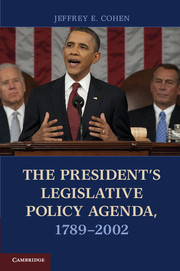Book contents
- Frontmatter
- Contents
- List of Figures
- List of Tables
- Introduction
- Chapter 1 The President's Legislative Policy Agenda
- Chapter 2 Studying Agenda Building
- Chapter 3 A Theory of Presidential Agenda Building and the Congressional Response
- Chapter 4 The Size of the President's Agenda, 1789–2002
- Chapter 5 The Substantive Content of Presidential Agendas
- Chapter 6 Divided Government and Presidential Policy Moderation
- Chapter 7 From the White House to Capitol Hill
- Chapter 8 Conclusion
- Bibliography
- Index
Introduction
Two Puzzles
Published online by Cambridge University Press: 05 November 2012
- Frontmatter
- Contents
- List of Figures
- List of Tables
- Introduction
- Chapter 1 The President's Legislative Policy Agenda
- Chapter 2 Studying Agenda Building
- Chapter 3 A Theory of Presidential Agenda Building and the Congressional Response
- Chapter 4 The Size of the President's Agenda, 1789–2002
- Chapter 5 The Substantive Content of Presidential Agendas
- Chapter 6 Divided Government and Presidential Policy Moderation
- Chapter 7 From the White House to Capitol Hill
- Chapter 8 Conclusion
- Bibliography
- Index
Summary
Since the presidency of George Washington, presidents have submitted legislative proposals to Congress. These proposals compose the president's Legislative Policy Agenda. This book asks why does the legislative policy agenda takes the shape that it does. What affects presidential decisions to include some proposals on their legislative agendas but not others? Do these presidential agenda-building decisions have consequences for congressional treatment of the presidential agenda? When building their legislative agendas, do presidents take into consideration the congressional context? Based on past research, the answers to these questions are not clear. Consider, for instance, the two following puzzles, the divided government puzzle and the modern president puzzle.
Puzzle 1: The Divided Government Puzzle
Research consistently finds presidents are more successful when their party controls Congress than with opposition control. For example, from 1953 to 2007, presidents received 30.5% more support in the House and 17% more in Senate with their party in control rather than the opposition (Ragsdale, 2009, pp. 500–502). A general consensus now exists that party control is one of the most, if not the most important factor conditioning presidential success in Congress.
- Type
- Chapter
- Information
- The President's Legislative Policy Agenda, 1789–2002 , pp. 1 - 12Publisher: Cambridge University PressPrint publication year: 2012

